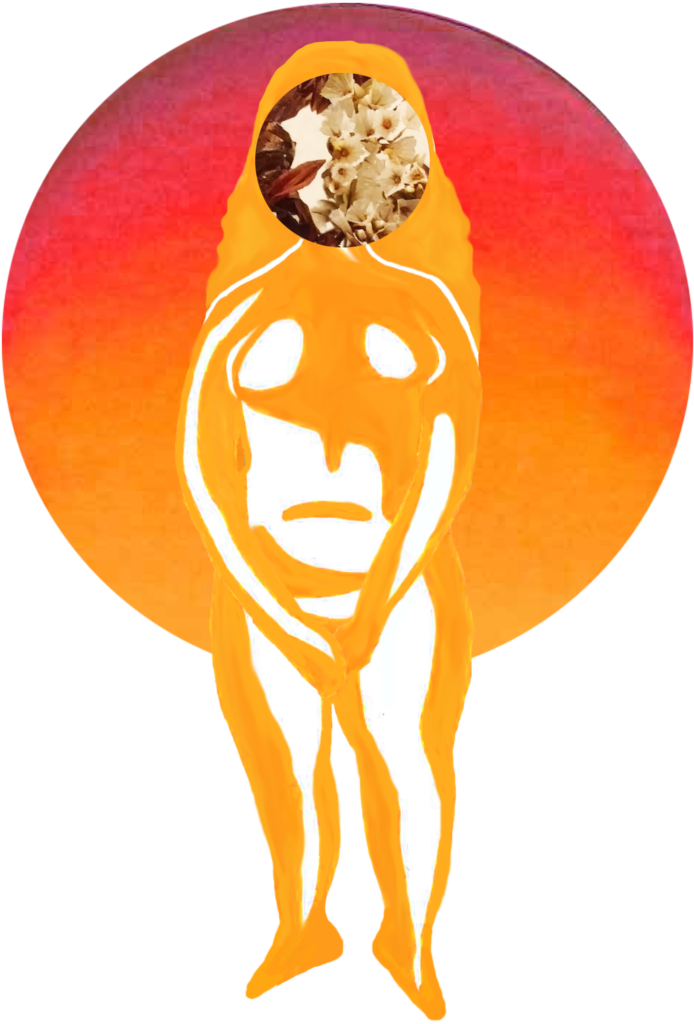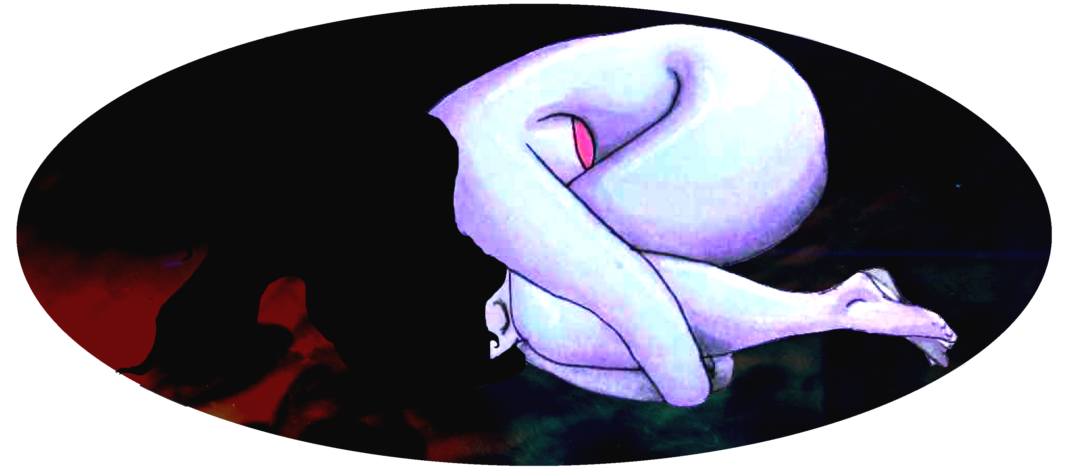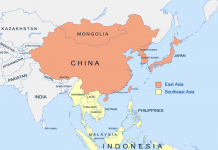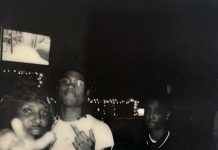The featured guest is Ivette Moretti in discussion about Sexual Assault and Trauma. The following is a transcription of a live recording which was conducted on 2/15/17. Original art work by the interviewee below.
The views expressed on this show are solely those of the DJs and not of Radio UTD or the University of Texas at Dallas as a whole.
Hi my name is Ivette. I’m a friend.
We’ve known each other for about four or five years now.
Yeah, you were my first friend in college.
Weird.
Wow.
I just want to remind Ivy that this show is a safe space. So if there are any questions that I ask that make you feel uncomfortable, you can just say pass and I won’t push it at all. It’s really brave of you to step up.
Oh, thank you.
Also before I start, someone sent this to me on Facebook. The Student Wellness Center is sponsoring a sexual assault survivor support group. For more information, email kjs160730@utdallas.edu.
We are talking about sexual assault today but I want to start off with what you were like as a child. Tell us about that.
I grew up in Wisconsin, in Madison, it’s like the Austin of the North. So it’s a hip, progressive city. That was cool. My parents divorced when I was six and then my mom got remarried, got divorced again, and remarried again.
So, kind of turbulent?
Yeah, kind of. Then we moved across the country here.
Was there culture shock?
Yeah, I was made fun of a lot because I had an accent, a very thick ‘Fargo’-esque Northern accent. I guess it was a bit of a culture shock. I was used to people being more open-minded about certain things, but it wasn’t bad.
Do you have any specific memories, good or bad, of your childhood? Off the top of your head.
There are these lakes in the city that I lived in that would freeze over and they used to have these giant ice kites. Huge, kind of like Macy’s Parade Day float style, but they’re kites. You guys go on the lake and there’s ice fishing, some people ice skating, and these huge kites. You said pleasant memory and that’s my go-to.
We won’t be specifically talking about the event but could you explain the situation, like how old you were, year in college that sort of stuff?
Yeah, it was my first year in college and I didn’t really know that many people and also I was very excited about finally being free. You know. I had physical freedom, I could go out and do things that I wanted to do. No parents. I didn’t have a curfew. I think that parts of me were just overexcited and overeager to explore my sexuality and my social attributes, like the way that I was socially. And I also like to experiment with my consciousness. There was a time when I was unsure of who I really liked and I wasn’t promiscuous but I would go hang out with different people all the time and did what I wanted to do.
But I was young and there was this older boy who I thought was a cool guy but wasn’t interested in. He asked to hang out and I said okay because I don’t have any friends, so I’ll hang out.
Did you disclose to anyone?
No, not at first. Not for months. At the time Kyle you were actually one of my closest friends and you were one of the people that I told first. But I think, just because of the circumstances, I was ashamed. I knew that I hadn’t done anything wrong but I was also ashamed somehow. Some part of me from the experience, didn’t want people to know that that had happened to me for some reason. That I had gotten myself into that trouble or I made a bad decision because I’m always making bad decisions about promiscuity and stuff like that. I knew that I didn’t do anything wrong but I still felt ashamed so I didn’t tell anybody.
There’s a lot of victim-blaming still out there. Maybe you were worried about that?
Yeah, and I also was worried if people knew about it in general that they would get a bad idea of me and think cruel high school style thoughts and make judgments off of my personal decisions. I was just scared.
When you disclosed to people, how did they respond? Did they view you differently?
Some people. It depends on the person. My friends did not view me differently I don’t think. They were very, very supportive; the people that I actually did trust.
There were people who had heard about the incident from the other person’s end who flat out refused to believe that that had happened and flat out refused to believe me and said I was a liar. And it was really hard because I don’t know how to tell them that it happened and that it is true. You can’t argue with them if they don’t believe you so you just have to deal with it.
I’m sorry about that.
It’s okay. In the end that ended up changing. It turned around.
How did people’s disbelief effect you?
In the culture that I’m surrounded by, people are very open about their support for you. So I was shocked when I didn’t have it. When it wasn’t there, I didn’t expect people to not believe me because all the things I see on Facebook, and the dialog that I hear around me is so supportive and inclusive and trying to get the word out but somehow it fell short when I actually needed it.
So you dealt with the disconnect between what people present online versus their actions.
Big shock between the two.
You were in your first year in college, so on top of getting used to everything else, like managing time and school work, having to deal with that seems rough.
It was hard. I just felt like people didn’t like me for years afterward for some reason I always had this resonant feeling. Maybe there was negativity surrounding me because of this issue.
Eventually the University found out. Could you explain how that happened?
A similar incident had happened to somebody else with the same person. And they had told someone about it and they had a more proactive community. So those people came forward to the university. You were telling me the other day that we’re not covered under Title IX.
So if someone goes to the Student Counseling Center and says that they have been sexually assaulted, they don’t have to report it to the police or University. But I think the Dean’s office is completely different. I actually looked up the UTD policy on this sort of stuff.
Can we hear it?
Online it is known as the Prohibited Discrimination, Sexual Harassment, Sexual Misconduct Policy. I was looking at it and you can be anonymous but I don’t know when that was added because it was revised in 2012, 2015 and amended in 2016. So, they might have changed the policy since this happened to you.
At the time I think it was anonymous.
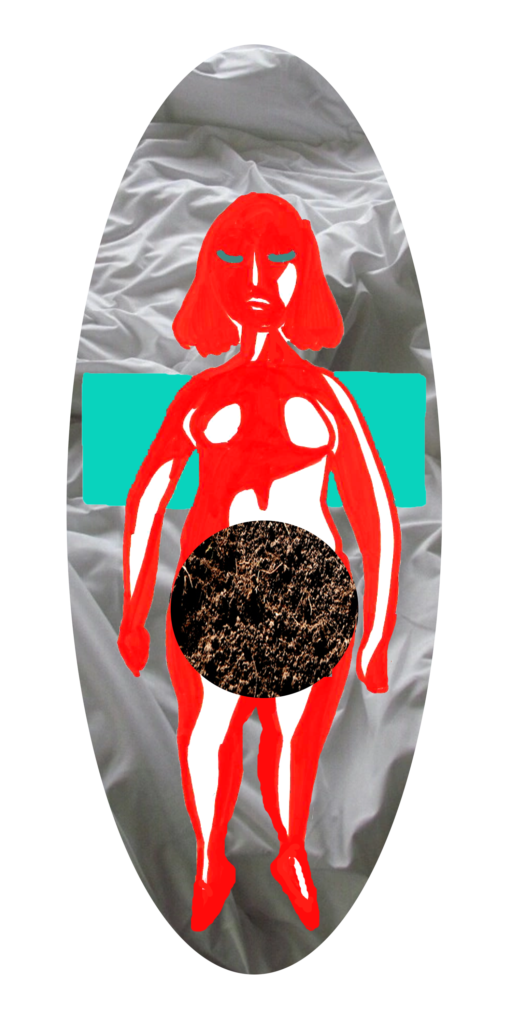
~~~~~~~~~~
In the interview, I mentioned that a person could report an event anonymously and the University would only interview the attacker. Now that I have thought about it a little bit, it makes more sense that the University would follow up with everyone involved in the incident; which is how Ivette got involved.
~~~~~~~~~~

I was put into it. In a way, I am glad, it made me confront the issue because I spent a lot of time trying to forget it that I didn’t confront it ever. Until I had to. Until people said “we need to talk about this; this is a problem”.
So to summarize, someone told their friends, their friends told the University, then the University contacted you?
Yeah, to support the other person’s allegations; they wanted to build their case.
How did it feel to have some University officials ask you about something that you didn’t want to talk about?
Well, there is a mixture of feelings. At first, I felt ashamed that I hadn’t done that myself. I hadn’t felt like I could do that for some reason. But then I realized that there was a lot of stuff going on in my life that made me feel like I couldn’t talk about it or want to report it. There was just a lot of stuff. So I was ashamed because I hadn’t done it myself but it was nice knowing that there were people who very much cared about the issue and wanted to do something about it. It was, not traumatizing, but it made me anxious how aggressive they were about it when it was something that I hadn’t fully processed myself and I didn’t know how to give firm allegations and firmly build up what had happened because it was so repressed that I didn’t know what to tell them a lot of the time.
I remember you getting really anxious about the emails because they kept emailing you to set up an appointment.
Right. I didn’t want to talk about it. “Please, I’m busy in school.” It became something where it was weekly having to go talk about it for legal reasons, not for counseling reasons, and it was frustrating.
I feel like they could have handled it better. Again, just to remind everyone, these are my views, not UTD’s or Radio UTD’s.
Yes, these are our views.
In general, how did this event change you?
For a long time, I had negative views on myself about not coming forward or not sticking up for myself. Struggling with that and knowing that I was perfectly valid in my decisions that I made. So, it was really hard reconciling my bad ideas of myself with what I knew the reality to be.
It also made me really anxious around other people. I had a lot of distrust. I started getting anxious that people were thinking things about me that they didn’t actually think. It got worse and worse over time because it just compounds.
I also think it made me want to get into a long term relationship after that because me dating around got me into the thing in the first place. I think it had this weird residual effect on me, but now I’ve moved on from that.
How did you cope?
I kept myself very busy, kept moving forward academically and in my artistic projects. Actually, artistic projects was a big thing that I did. Writing a lot of music.
I’m trying to remember. We lived with each for about a year. There was one point when you, our friend Zack, and I just stayed in the house and played Animal Crossing. Was that after the event?
That was.
So we all had pretty bad social anxiety.
We wouldn’t leave our apartment for days. We would just sit and watch each other play Animal Crossing on the Gamecube – it’s a one-player game – because we just couldn’t stand the idea of going out and interacting with people. That was definitely around that time. I only felt comfortable around you two people.
You used to make a comic, ‘How to Talk to Boys’, was that also around the same time? Did you make them before or after?
It is actually split half-and-half; some of it was before and some after, and the ones that are after you can see a difference. They used to be more whimsical and then they got more cynical.
So, art and video games and keeping busy.
That’s coping.
You mentioned this a little bit earlier, but how has it affected your relationships and friendships?
I think I’m more selective in who I am going to hang out with a lot now because if I don’t feel totally comfortable, I probably won’t try to pursue that. I just have a more standard process deciding where I am going to be, physically and socially. I have to think about it more. I’m less bubbly, outwardly.
Relationship-wise I don’t really know if that made me change anything about how much I tell them, how much I trust them. Because if they got that far in the first place then I probably trust them already.
I don’t want to portray you as a victim, so tell us about what you’re doing now. There are doing some great things.
I have a radio show called ‘High Delight’ right here on Radio UTD, Fridays from 10am to 1pm. I play lots of music. This semester is mood-dreamscapes, or what I have been calling the theme, but I pick a weird ethereal memory that I have and then try to format a show around it. There was one show that was based around Hubba-bubba tape, in the roll, if you were to take a collage with hubba bubba tape and a tank top with rhinestone stars from Old Navy and the Lizzy McGuire Movie soundtrack. Late elementary school is what I was getting at.
I was never really into rhinestones, but I feel you.
For some reason I had a bunch of Old Navy tank tops with rhinestones on them.
I also spend a lot of time at school and work. I work in a research lab that studies neural networks. So if you don’t know what those are, they are algorithms that are meant to pick up certain patterns and images. Specifically for faces, we have these computers that are trying to find faces in images and characterize them. I do the analysis of these things. All those systems that you see where the FBI finds a person that you saw in a video camera, the crappy CCTV gas station footage, those algorithms are not actually that great. They can’t really do what they are portrayed as doing. So I do analysis of that kind of software.
That’s so cool. I remember 2 years ago when Ivette was telling me about a professor that she admired and wanted the professor to notice her. Now she works for that professor.
Now she’s my boss. She is very inspiring, a very powerful woman who is very smart. She is a very smart person who just wants to do science and get you to do science too, and I just feel very honored to have a boss who is so supportive of undergraduates in research and also is such a good role model for other women.
I have so much fun. I just found out that we’re going to Florida for a conference. I want to keep processing faces.
~~~~~~~~~~
Ivette didn’t mention but she is the lead singer to a local band, Field Guide. Here’s a link to their bandcamp:
https://fieldguidetothe214.bandcamp.com/
~~~~~~~~~~
I was thinking about how the University handled your situation, to me it seemed like they were proceeding without your consent. I’m not quite sure how to word this…
I think I get what you’re saying. It felt a little bit like a violation somehow. Like they weren’t being respectful about what had happened to me.
Did it feel that way to you?
Kind of. I knew the reasons behind what they were doing, they didn’t want these things to happen to other people but I don’t think they realized that I hadn’t confronted it myself; that the only exposure and processing I was getting was when I was talking to them legally. Which they just want you to recount it and ask you more questions about very specific details that I don’t remember that well. It was frustrating not being able to answer their questions and also the only thinking that I had to do about it was dissecting the night further and further and not about how I felt about it and how it was affecting me. It was mainly about the facts. And I understand what they were doing but I wish that I had had a chance to deal with it emotionally before having to dissect it and talk about it a lot. They didn’t really take those measure and I felt like I didn’t want to talk to them after a certain point because I was so frustrated by it.
The reason they were asking me about it in the first place is because they want a statement to use and I didn’t quite feel comfortable making a legal statement about something I don’t really remember with complete clarity. So I didn’t feel comfortable doing that; I didn’t want to keep dragging it on. They got kind of aggressive about wanting a statement over and over again. It got to the point where I had to explain that no matter what I wasn’t going to do it and I’m sorry.
So I chose not to make a legal statement with the police but I did for the University. So they have it on two levels. They have university discipline and police discipline and I chose to not go to the police. At that point they were going to do something either way so I didn’t want to make this a larger problem that would take over months and months of my life.
It seemed like it was beginning to take over because I remember weekly emails or appointments.
Yeah, I was trying to move on with my life and be a normal person.
That is within your right to not come forward if you don’t want to.
Yes. I just get nervous that someone out there is upset that I didn’t come forward because it could have stopped something or that I didn’t come forward and I’m not respecting myself because of that. It’s just a mess because I don’t know what the right decision is and I only knew what was right for me. I understand better for the whole but it was a personal incident and it’s hard to make the right decision.
